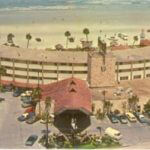One of the secrets to moving forward with your hotel marketing strategy is moving backward.
It may sound strange at first but it’s true. Your brand’s history has the potential to attract new guests and keep them coming back year after year.
Getting them to click that “Book Now” button is all about understanding what you already have to offer as well as how to leverage it.
Experience
While older generations may still depend on common amenities and conveniences at a small historic hotel, the up and coming travelers want experiences that bring them closer to the world around them.
In other words, it’s time to ditch the emphasis on flat screen TVs and air conditioning units.
Free Wi-Fi is hardly worth promoting anymore. It’s a given.
For example, “wellness” isn’t just a popular search term- it’s a billion dollar industry. If you have state of the art spa and fitness facilities you’re well aware of search volume around these terms.
What if you only have a few weights and a vending machine? You can’t compete with the luxury resorts but there are other ways to highlight your hotel within this sphere.
What experiences are offered nearby? The best massage studio in town? Surf lessons from a long established company with great reviews?
Maybe you don’t offer those services exactly but you can promote your outdoor showers and ocean views. Promote the desirable experience s in your area and be the best accommodations nearby.
Tradition
Leveraging a tradition is a winning strategy for your hotel brand. Storytelling is tradition in perpetuity. Traditions may include annual events and conferences held at your property.
If your hotel is a hot spot for weddings and celebrations you should have a dedicated landing page for prospective couples.
Share real life stories on your blog or on your weddings page. The fact that others have made memories and honored tradition at your hotel is important to people.
Another example is leveraging a traditional game or pastime. Classic Hotels & Resorts makes the most of their golf course by including it as a page on their Phoenix resort website and hosting an additional site, exclusive to the course and its tournaments.
Building out from your website to highlight traditional activities can appeal to new or niche audiences. Notice the golf awards and accolades listed on the golf specific page. Don’t forget to include these and other testimonies that affirm your brand’s reputation and notoriety.
Community
One of the most loved properties The Inn at Laguna Beach in Orange County California leverages its partnership with landmark, local restaurant. If your brand is going through a redesign or rebrand– it’s important to network with a well-known establishment.
Las Brisas has been an iconic restaurant in the area since 1938. Wisely, the hotel has partnered with its neighbor to capture attention during upgrades and company changes. Collaboration drives brand awareness.
Las Brisas features the Inn as the place to stay and the Inn features Las Brisas as the place to eat.
Mark Jennings of Kimpton Hotels & Restaurants remarks that “what people want is something they feel they’re not going to get somewhere else” and that “the important thing about providing recommendations for guests is that the relationships are created locally.”
At the heart of these local-focused initiatives is loyalty. It’s no secret that loyalty requires time to develop within a community and beyond.
Evolution
In keeping up with competition and trends many hotels fail to leverage change. Instead they advertise having as much of or more than what everyone else is offering.
Though it’s important to keep up with competition, there are other, creative ways to draw attention to your brand. Namely, by emphasizing its evolution.
Demonstrate the value of your hotel over time. Small properties in mega cities can steal the spotlight by leveraging rich, dynamic histories.
The Victoria Hotel in Melbourne was a coffee place, a dry hotel, then a landmark meeting space during the 1956 Olympics.
Today, they’re a budget friendly hotel in “the world’s most livable city” and you can learn all about those 128 years on their about page.
Engaging content keeps people exploring more about what you have to offer.
Consistency
Your hotel doesn’t have to be an ancient relic of a building for you to capitalize on its history. In fact, trying to compete with castles, chateaus and palaces is pretty unreasonable for most.
It’s no wonder why travelers forgo savings and are willing to pay sky high prices to stay at well-known hotel chains; they trust the consistency of a hotel’s experience.
The hype and hysteria, thanks to MTV and the early 90’s, made Daytona Beach famous for spring break. Decades later, the party has died down leaving hoteliers and marketers to lean on other tactics.
The Hawaiian Inn Beach Resort creates a “trip to the past” experience on their blog. Posting side-by-side, then-and-now photos of their oceanfront property earns attention.
“It reminds residents of how much change this community has seen and that we’ve been there through it all,” says Leah Preston, marketing manager, “Potential guests love that we’ve been established for so long.”
Your brand, over time, makes you more historic than you think.
Author Bio: Courtney Capellan is a digital marketing analyst and freelance writer. She spent fifteen years in hotel and restaurant management. With a degree in foreign policy and international relations she considers herself both well-traveled and under-traveled.



